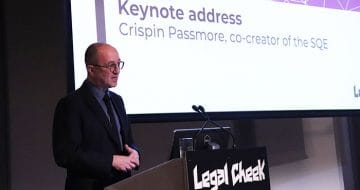Whoops

The Solicitors Regulation Authority (SRA) has published what one law school chief claims is the wrong answer to one of its own sample questions for the upcoming Solicitors Qualifying Examination (SQE).
Ken Oliphant, a professor of tort law and head of Bristol Law School, noted the apparent error on Tuesday, tweeting:
So I’ve had a look at the sample questions for the #SQE Part 1 put out by the SRA. They include this little gem, based on Campbell v MGN. The answer we’re told is E. Whoops! No it isn’t! It’s A… /1 pic.twitter.com/GKHUpVbrH8
— Ken Oliphant (@KenOliphant) February 11, 2020
The MCQ forms part of a larger bank of 90 sample questions published back in December by the regulator, “to help both education providers and candidates plan SQE training and prepare for the assessment”.
Helpfully, Oliphant goes on to explain why in his professional opinion the answer to the human rights/privacy question is A, and not E, as the regulator states in its answer key at the bottom of the document.
The Human Rights Act claim for breach of Convention rights is only AGAINST a public authority, which the newspaper isn’t. There would be a good invasion of privacy claim against the newspaper, but that’s a matter of common law, specifically the law of tort. /2
— Ken Oliphant (@KenOliphant) February 11, 2020
The so-called horizontal effect of s 6 HRA is no doubt what the SRA’s (wrong) answer had in mind. But whether s 6 has such effect is disputed and there’s little case-law support for the analysis. /3
— Ken Oliphant (@KenOliphant) February 11, 2020
In any case, claims for invasion of privacy don’t need to rely on s 6 and IIRC the House of Lords didn’t in fact rely on it in deciding Campbell. /4
— Ken Oliphant (@KenOliphant) February 11, 2020
The law prof rounds off his analysis by suggesting the apparent error “doesn’t inspire massive confidence in the quality of the #SQE assessment!”
In 2018 the SRA handed education giant Kaplan an eight-year deal to develop and deliver the SQE, which will replace both the Legal Practice Course (LPC) and Graduate Diploma in Law (GDL) when it comes into force in September 2021.
A spokesperson for Kaplan told Legal Cheek: “Questions go through an extensive review and editing process, but where there nevertheless is a flaw in a question, which happens rarely, this normally becomes evident from the statistical analysis of the answers. A range of statistics will be analysed including for instance whether the people who did well on the test as a whole did well on this question.
They continued:
“All questions will be reviewed by solicitors in the light of the statistics after every sitting. If a question appears to be flawed it will considered by the Examination Board and the Board can withdraw it from the final calculation of candidate scores.”


